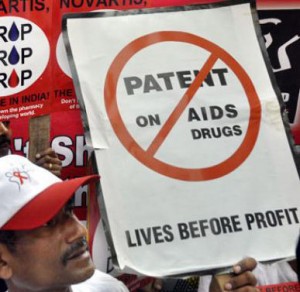 On February 28, the Indian Supreme Court had been scheduled to hear arguments in Novartis’ challenge to the patentability criteria of the Indian Patents Act. On the 27th, PharmaBiz.com reported that the hearing may be delayed until some time in March.)
On February 28, the Indian Supreme Court had been scheduled to hear arguments in Novartis’ challenge to the patentability criteria of the Indian Patents Act. On the 27th, PharmaBiz.com reported that the hearing may be delayed until some time in March.)
Novartis’ challenge centers around section 3D, which does not allow the granting of a patent for a “new form of a known substance which does not result in the enhancement of the known efficacy of that substance.” Its patent for imatinib mesylate (Glivec) was denied under this act, because it is a new salt form of a previously patented medicine. The company wants the Supreme Court to apply a loose definition of “efficacy,” which would allow the patenting of imatinib mesylate and other new forms of previously patented medicines.
Health advocates warn that this will block generic competition. They argue that India’s role as “pharmacy to the developing world” – 98% of all medicines purchased by PEPFAR are Indian generics – means that people worldwide depend on generic competition in India. A good backgrounder on the case has been put together by MSF, available here.
Activists protested outside Novartis’ Annual Shareholders Meeting in Basel last week. Unni Karunakara of Medicines Sans Frontieres said in a statement on the protests that
We are asking Novartis once and for all to stop this legal battle in India that is a direct attack on the pharmacy of the developing world. We will not stand by silently and watch our source of affordable medicines dry up in the future. We rely on these drugs to do our work in more than 60 countries today.
The protests at the shareholders meeting were organized by Act Up-Basel, Act UP Paris, the Asia Pacific Network of Positive People, Berne Declaration, Health GAP, International Treatment Preparedness Coalition, and Oxfam International. Act UP-Basel has posted videos played at the rally. For more on the protests, see news coverage from AFP, Le Figaro, Pharmalot,
A petition signed by over 45,000 people to date asks the company to withdraw its case:
We call on you to withdraw your company´s supreme court case against the Indian government. Your legal case threatens access to life-saving affordable medicines for millions of people across the developing world. Access to affordable medicine is a fundamental human right — do not risk being held responsible for the lives of millions. Stand for healthy people, not just healthy profits by dropping the court case now.
Last week, a spokesman from Novartis issued this response to the protests, originally posted on Pharmalot:
We believe that working through the judicial system is the legitimate and appropriate approach to gaining clarity on the unique aspects of India’s patent law and have confidence the Supreme Court will make the right decision based on the law of India.
We disagree with assertions by a number of groups that access to medicines is threatened by our case. The basis of this argument is false and very misleading. Currently available generic drugs launched in India before 2005 – including HIV/AIDS medicines and generic versions of Glivec – will continue to be available under a grandfather clause in the Indian patent law regardless of the legal outcome of our case. All pharmaceutical products, including HIV/AIDS medications, have been patentable in India under the existing patent law since 2005, and some have been patented.
Novartis fully supports flexibilities in the international trade agreements that provide for countries like India to make exceptions to patent rights. These provisions allow a government to issue a compulsory license to other companies to produce pharmaceuticals in case of a national health crisis. We are not challenging these provisions…
In pursuing this case, we are seeking clarity. We need to know if we can rely on patents in India and whether as a research-based organization we can continue to invest in the development of better medicines for India.”




